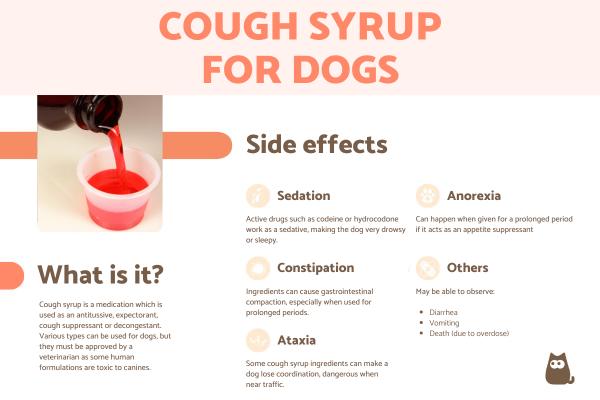
The first thing you need to know when purchasing cough syrup for dogs is that we cannot use those products formulated for humans without strict veterinary prescription. This applies to both prescription-only and over-the-counter medications. Many ingredients used in cough syrups are not suitable for dogs, both pharmaceutical grade and so-called natural alternatives. There are cough syrups either specially formulated for dogs or human products that can be given to canines, but we still should only give them in certain circumstances.
At AnimalWised, we find out more about the uses, dosage and side effects of cough syrup for dogs. We can see how effective different types of cough syrup for dogs can be and how they may be used safely.
Can dogs have cough syrup?
Cough medicine can come in various forms. Syrup is a type of medication which is useful because its liquid form allows internal tissues to be covered in a formulation containing certain active ingredients. This is similar to how topical medications are used externally. The active ingredients will vary according to the product and they can be sold under various trade names.
When administered orally, cough syrups help to treat the symptoms of a disease, rather than as a direct curative. They do so in various ways:
- Antitussive: this action works by suppressing the cough reflex by interfering with the signals sent by the brain.
- Decongestant: narrows blood vessels in the respiratory tract which can reduce inflammatory processes, helping to relieve symptoms.
- Expectorants: breaks down and loosens the mucus which is accompanied by wet coughs.
Different brands of medication are either prescription only or over the counter. In the latter category, they are sold because they are considered safe for self-administration. This does not mean we can use them irresponsibly. Some cough syrups can contain substances which are either harmful or even addictive if abused.
The same applies when giving cough syrup to a dog. While dogs can benefit from the use of cough syrup, this will depend on their individual needs and how the medication is administered. For this reason, we should only use cough syrup under the strict advice of a professional veterinarian. This is especially the case with cough syrup marketed for human use since it may contain ingredients which are very harmful to dogs.
Coughing in dogs may be due to various causes, such as if a dog has something stuck in their throat.
What cough syrup can be given to dogs?
Since not all cough syrup is suitable for use in dogs, we need to be careful what product we use. Veterinarians know both what medications are safe for dogs in general, as well as those which will be helpful for each canine patient. These medications can be either prescription-only or over-the-counter drugs. This is because some can only be used safely under strict guidance by a health professional.
With this in mind, we look at some of the types of cough syrup for dogs:
- Codeine: this is an active ingredient in many medications, but is particularly associated with cough syrup. It works as a cough suppressant, but is a prescription-only drug in many places due to its addictiveness.
- Dextromethorphan: although it is also prescription only, it is a non-narcotic cough suppressant which is often used as an alternative to drugs like codeine. Needs to be specially formulated for canines use since many formulations contain harmful excipients such as xylitol which are toxic for dogs.
- Hydrocodone: a controlled substance in the USA which is used as a cough suppressant.
- Butorphanol: a cough syrup with sedative properties.
Robitussin is a cough suppressant which can be sold over the counter, but which still needs to be approved by a veterinarian. Other cough syrups are marketed as being natural or homeopathic. Regardless of their efficacy, these often contain ingredients such as essential oils from plants that are toxic to dogs. These should also only be used when approved by a vet.

Uses of cough syrup for dogs
All cough syrup is used to treat coughing. However, coughing is a symptom of a disease and not a disease in itself. While it is most associated with respiratory disease, a cough could be a result of various health problems. These include intoxication and congestive heart disease in dogs. For this reason, we should only give it after veterinary diagnosis since these are serious conditions which require professional treatment.
The following are canine health conditions which may benefit from the administration of cough syrup:
- Tracheal collapse: a condition that occurs most frequently in small dogs, such as Yorkshire Terriers. It is characterized by a loss of rigidity of the trachea, affecting proper breathing and causing chronic coughing.
- Foreign bodies or irritants: if a dog has swallowed or inhaled something they shouldn't, it can cause a cough due to damage to the respiratory tract which may be relieved by cough syrup.
- Mild upper respiratory tract infections: the most frequent example is the common cold which usually resolves on its own, but cough syrup can help manage the symptoms.
- Postoperative care: surgical procedures may require the use of intubation or other procedures which can cause damage to the respiratory tract. This can result in coughing, as can the use of certain anesthetics.
- Chronic bronchitis: a condition which is due to inflammation of the bronchioles in the lungs. Not all cough syrup for dogs can be given over a prolonged period of time.
- Kennel cough (infectious tracheobronchitis): one of the most common uses of cough syrup for dogs. It is a highly infectious disease which requires isolation of the animal to avoid its spread. Our related guide explains more about treating kennel cough in dogs.
- Cardiac disease: although cough syrup may be used to treat coughing associated with cardiac disease, it is most important that the underlying cause is treated or managed.
Cough syrup for dogs dosage
The dosage of cough syrup required for each dog will depend on the product. Even given this, it is important we follow the instructions given by the veterinarian since they may vary according to the individual needs of the dog. Generally speaking, dosages are determined by weight. With this in mind, we look at the dosage of some common cough syrups for dogs:
- Codeine dosage: 1–2 mg/kg every 6–12 hours.
- Dextromethorphan dosage: 0.5–1 mg/kg every 8–12 hours.
- Hydrocodone dosage: 0.25 mg/kg every 6–12 hours.
- Butorphanol dosage: 0.55–1.1 mg/kg every 6–12 hours.
All of the above cough syrups are given orally.
How to give cough syrup to dogs
Cough syrup is a form of medication known as an oral suspension. This means the molecules of the active ingredient are suspended in a liquid form. Part of its mechanism of action is that it can coat parts of the respiratory system such as the larynx, meaning its action can work directly on certain tissues. With this in mind, cough syrup can be administered in one of two ways:
- Directly into the dog's mouth: using the dosing oral syringe filled with the required amount based on the dog's weight. To do this, gently open the dog's mouth and insert the syringe from the side, applying the syrup calmly to avoid causing fear in the animal.
- Mixed with your dog's wet food: this option works for cough syrups with active ingredients which work as cough suppressants, but won't coat the airways in the same way. They may be less effective as an expectorant when mixed with food. Some are made more palatable for dogs, but this is not always the case with cough syrups marketed for human use.
Some oral suspension drugs are also used to treat gastrointestinal diseases, such as metronidazole for dogs.
Side effects of cough syrup for dogs
Different types of cough syrup for dogs will have their own specific side effects. This is due to the active ingredients and excipients used in their formulations. Cough syrups are often associated with the side effect of drowsiness, although some may be marketed as non-drowsy.
Some common side effects of cough syrup in dogs include the following:
- Sedation: as we have explained, some of the active drugs such as codeine or hydrocodone work as a sedative. They can make the dog very drowsy or sleepy, something which can help them recover, but may not be suitable for some dogs.
- Constipation: the ingredients can cause gastrointestinal compaction, especially when used for prolonged periods. They may be given with other drugs to counteract this side effect.
- Ataxia: in addition to the drowsiness, some cough syrup ingredients can make a dog lose coordination. This can be dangerous, especially if they are in a risky situation such as being near traffic.
- Anorexia: only happens when given for a prolonged period and is a result of the cough syrup suppressing appetite.
There may be some cases where gastrointestinal side effects such as vomiting or diarrhea in the dog may occur. In these cases, an alternative may be required. Due to its sedative action, overdose can cause death in the dog as it shuts down their bodily systems. This is another reason you need to use the approved dosage.
Learn more about the causes and treatment of a dry cough in dogs with our related guide.

Contraindications of cough syrup for dogs
The use of cough syrup for a dog should be determined by a veterinarian. There are certain cases where its use should be avoided or completely contraindicated. These include:
- Hypersensitivity or allergy: to one or more of the active ingredients or excipients.
- Pregnant or lactating females: can cause damage to unborn fetuses or newborns.
- Liver disease or problems: since some of its components can be metabolized by the liver.
- Taking other drugs: some other drugs can have harmful interactions when taken with cough syrup.
Remember that you should not self-medicate your dog. I's always advisable to visit a veterinary center so a professional can diagnose and prescribe treatment. The video we share below explains what to do and what to avoid when treating a dog's cough at home:

This article is purely informative. AnimalWised does not have the authority to prescribe any veterinary treatment or create a diagnosis. We invite you to take your pet to the veterinarian if they are suffering from any condition or pain.
If you want to read similar articles to Cough Syrup for Dogs, we recommend you visit our Medicine category.